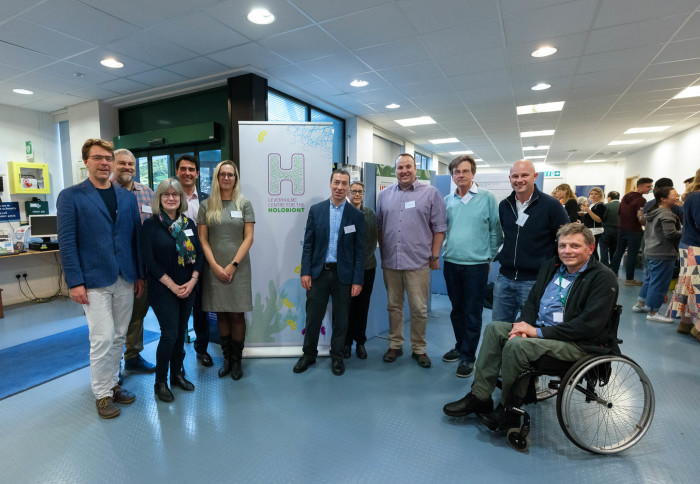Imperial and partners launch the new Leverhulme Centre for the Holobiont
by Emily Govan

A new research centre to probe the mysteries of the microscopic has been launched at Imperial’s Silwood Campus.
The Leverhulme Centre for the Holobiont aims to understand how microbes interact with their hosts across the tree of life. The new Centre is a collaboration across Natural Sciences, Engineering, and Medicine at Imperial College London, and partners from nine research institutes: the Wellcome Sanger Institute; the EMBL’s European Bioinformatics Institute (EMBL-EBI); the Natural History Museum; the Royal Botanic Gardens Kew; CABI; the Rosalind Franklin Institute; the Mary Lyon Centre; ZSL London Zoo and the Tara Oceans Consortium.
The Centre is funded by the Leverhulme Trust, which will provide £10m funds over 10 years to understand the numerous ways by which microbes interact with their hosts, and how this knowledge can be used to address global challenges.
 The first phase of the centre’s activities will characterise how microbes and their hosts (“holobionts”) vary in the natural world, focusing on tractable organisms for which copious specimens have already been collected. Holobiont relationships are not fixed: mutually beneficial partnerships can erupt into conflict when new situations emerge due to changes to the external environment (climate change, pollution) or to changes to the internal environment (host diet, physiology).
The first phase of the centre’s activities will characterise how microbes and their hosts (“holobionts”) vary in the natural world, focusing on tractable organisms for which copious specimens have already been collected. Holobiont relationships are not fixed: mutually beneficial partnerships can erupt into conflict when new situations emerge due to changes to the external environment (climate change, pollution) or to changes to the internal environment (host diet, physiology).
By characterising how microbiome-multicell relationships vary across the Tree of Life, the Centre will acquire the baseline against which 'unnatural' variation is measured. Alongside this work, the new centre will also develop the new field of artificial holobionts through alterations of hosts and their resident microbes using synthetic biology and other bioengineering approaches. The Centre will apply these principles to tackle urgent applied questions in conservation biology, restoration ecology, and agriculture.
 By understanding how global change is altering holobiont relationships, the Centre will be able to predict the repercussions for the future of life on Earth, focusing particularly on insect pollinators and amphibians, which have suffered catastrophic declines due to human modifications of their environments, with global repercussions.
By understanding how global change is altering holobiont relationships, the Centre will be able to predict the repercussions for the future of life on Earth, focusing particularly on insect pollinators and amphibians, which have suffered catastrophic declines due to human modifications of their environments, with global repercussions.
Finally, the Centre will look at plant-microbe interactions, and how they can be used to create next-generation sustainable agriculture that use crop microbiomes to boost efficiency, reduce harmful side effects of pesticides and other chemicals, cope with global change, and complement conventional techniques.
Professor Bell will be supported by Imperial lead academics including Professor Marc-Emmanuel Dumas (Faculty of Medicine) and Dr Reiko Tanaka (Faculty of Engineering). Experts from partner institutions will provide a wealth of expertise and technology in their respective fields.
‘We’re extremely grateful for this fantastic opportunity to open a new whole new area of research that will really push the boundaries of this new discipline.' Professor Tom Bell Director, Leverhulme Centre for the Holobiont
At the launch of the new Centre on 21 October, in Silwood Park, Professor Tom Bell, Director, expressed gratitude to all the partners and Leverhulme Trust for the support. In his talk, he elaborated the synergetic and multidisciplinary approach the centre will take in the next 10 years to understand alter relationships between the organism and microbes in many research areas, from agriculture to amphibians.
Professor Bell said: ‘We’re extremely grateful for this fantastic opportunity to open a new whole new area of research that will really push the boundaries of this new discipline. The long-term funding lets us address some global challenges in a whole range of topics, and the new partnerships we have created will let us tackle these challenges from new angles and using new tools and techniques.”
'We will uncover myriad situations where microscopic biodiversity is crucial for maintaining wildlife populations and species, but also cases where diverse and abundant wildlife communities support microbial diversity that otherwise may be in decline.' Professor Trent Garner Institute of Zoology
Professor Trent Garner, from the Institute of Zoology, said: ‘The opportunity to exploit our extensive research and conservation network to understand the relationships between wildlife and the microbial world is not just an academic exercise. I expect we will uncover myriad situations where microscopic biodiversity is crucial for maintaining wildlife populations and species, but also as yet undescribed cases where diverse and abundant wildlife communities support microbial diversity that otherwise may be in decline due to the loss of wildlife we have been tracking for decades. Hopefully this partnership will allow us to develop strategies for holobiont conservation.’
Article text (excluding photos or graphics) © Imperial College London.
Photos and graphics subject to third party copyright used with permission or © Imperial College London.
Reporter
Emily Govan
Department of Life Sciences